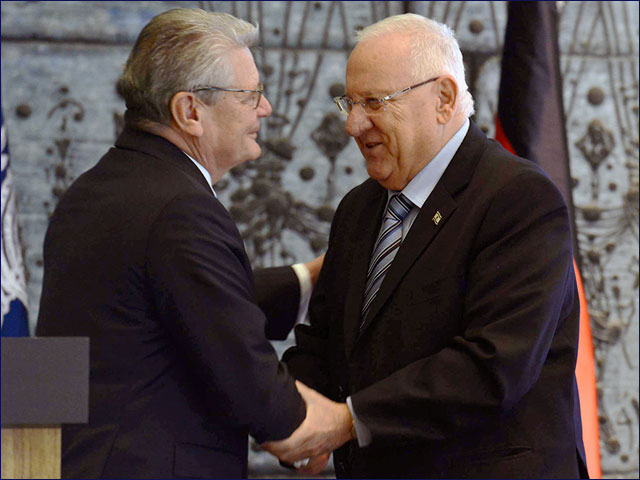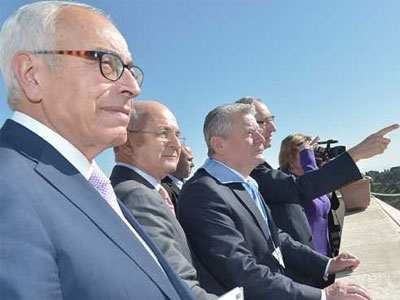(Communicated by the Prime Minister's Media Adviser)
Prime Minister Benjamin Netanyahu, today (Sunday, 6 December 2015), met with German President Joachim Gauck, who is visiting Israel for the conclusion of events marking 50 years since the establishment of diplomatic relations between Israel and Germany. The Prime Minister stressed the uniqueness of the bilateral relationship, which is characterized by a tragic past alongside a constant view toward the future and the continued deepening of cooperation based on the two countries' shared values.
German President Gauck reiterated the abiding commitment of the German people and leadership to Israel's security and prosperity.
Prime Minister Netanyahu said that the enlightened world must recognize and deal with - together - the threats posed by radical Islam, which seeks to return us all to a dark past. He also noted the importance with which he regards the continued effort to instill the unique nature of the bilateral relationship among the younger generation.

(Communicated by the President’s Spokesperson)
President Reuven Rivlin and First Lady Nechama Rivlin today (Sunday 6 December 2015), hosted the President of Germany Joachim Gauck and his partner Daniela Schadt, at the President's Residence, during President Gauck's official visit to Israel marking a jubilee for the inauguration of relations between Israel and Germany.
President Rivlin and his wife welcomed the German President and his partner to the Residence, where the two national anthems were played, and then the two Presidents gave statements to the media. “We are concluding here today a series of events marking 50 years since the establishment of diplomatic relations between Germany and Israel,” President Rivlin stated.
The President stressed that today, after 50 years of the establishment of relations between the two countries, the necessity of the connection between the two countries was fully understood. President Rivlin said, “One my formative political experiences in life came fifty years ago when I took part in fierce demonstrations, 'against diplomatic relations with Germany'. Protests that took place in the name of the dignity of the Israeli people. I remember well that at one of the demonstrations, at the presentation of diplomatic credentials by German Ambassador Rolf Pauls, many wore yellow badges as a protest against the playing of the German national anthem at the President’s Residence, and I stood amongst them. This was not just my opinion- it was the opinion of many. In passports issued by the State of Israel in its early years, it was written they were valid for all countries – apart from Germany. Mr. President, today I am welcoming you to the President’s Residence, having stood and listened to the German anthem played here, and I sensed more than anything that this event closes a personal circle for me. A closed circle, which is also an open circle. Fifty years later and the Israeli-German connections still awaken in me a certain sense of discomfort. Fifty years later, and today we know that the Israeli-German connections are correct, and necessary. It is vital for us, and essential for you. We are forever destined to be entwined together in a sense of pain and in hope.”
The German President thanked President Rivlin for his hospitality, and said, “I am very pleased to be here for the 50th anniversary of diplomatic relations between Israel and Germany. These relations are being reinforced thanks to joint projects marking the anniversary, and together we look toward the future. Thank you, Mr. President, not only for the official reception but for the warmth with which you received me and my delegation. We both were born during the war. When the Israeli President, a person such as yourself, who still remembers the past passionately speaks about a visit of friendship, it is another thing to I as an adult in Germany talking about it. The important thing is that we acted in certain ways as human beings and that is the experience that we have gained, and we will pass in onto the next generation.”
President Gauck emphasized the importance of recognition and cooperation between the younger generations, despite the shadow of World War II, and said, “We are aware that what we have achieved is based on values, and that peace cannot be taken for granted, and that is why it is so important that Israelis and Germans will work together at all levels, not only at the political level, but through culture, civic commitment and science. We must continue to strengthen the relationship. We have a multi-sectoral relationship and we should rejoice in that.”
The German President emphasized the importance which Germany gave Israeli statements - which were at times critical - over the actions taken by Europe, and the duty of Israel to defend its citizens and its independence, and said, “We will always listen to Israel's criticism of us, and of Europeans in general, in its various kinds of statements or actions. We will listen and take the dangers facing the world very seriously. The German Government will time and again state that it is important that the relationship between us will go on and that no one, neither today nor in the future, could negate Israel's right to defend itself and its very existence.”

(Communicated by the HUJ Spokesperson)
The Hebrew University of Jerusalem today (Sunday 6 December 2015) conferred an Honorary Doctor of Philosophy degree upon Joachim Gauck, the President of the Federal Republic of Germany, at the University's Harry S. Truman Research Institute for the Advancement of Peace in Jerusalem. The award was presented by the President of the Hebrew University, Prof. Menahem Ben-Sasson, and the Rector of the Hebrew University, Prof. Asher Cohen.
The award was conferred in recognition of President Gauck's exemplary public service and his defense of democracy, in particular his devotion to a free and unified Germany along with his dedication to bring justice to the German people; in tribute to his advocacy against global racism, extremism and anti-Semitism and his determination to preserve the memory of the Holocaust; and in appreciation of his support for higher education and his solidarity and friendship with the State of Israel.
The award comes as Israel and Germany mark 50 years of diplomatic relations. Calling the Hebrew University "an intellectual, a philosophical and a cultural home which unites Israel and Germany," President Gauck said: "When the most important university in Israel bestows this honor on the German Federal President, it also symbolizes the depth of the relations between our two countries."
Since being elected to the Presidency in 2012, Mr. Gauck has shown an extraordinary willingness to engage with Israel in close bilateral co-operation, and to present a common front against racism, extremism and anti-Semitism.
President Gauck said that, while “the process of moving closer to one another was arduous,” both countries have shown a strong desire to deal with the past in a way that makes a shared present and future possible: "On the one hand it is true to say that the past will not go away. It is something that has not been entirely removed, and that probably never can be entirely removed. On the other hand the past alone can no longer determine the present and the future. It can no longer undermine the trust that has been established. It can no longer prevent dialogue which is now resilient and able to withstand controversy."
Joachim Gauck is Germany's first President to hail from the former East Germany. He was born in Rostock in 1940 and grew up in the German Democratic Republic (GDR). In 1965, he pursued theology and became a Lutheran pastor. An active participant in the 1989 revolution to transition the GDR to a parliamentary democracy, he co-founded and served as the spokesman for the opposition movement, the New Forum. In his speech, he talked about the animosity expressed by the former East Germany towards Israel:
"I only got to know Israel personally in these recent times. GDR citizens were as a rule not allowed to travel to non-socialist countries, which of course included Israel. Moreover, in the official GDR propaganda Israel was portrayed as the spearhead of imperialistic interests in the Middle East, as an aggressor whose goal was to destroy the Palestinians. East Berlin allied itself with Arab states against Israel, which was not seldom compared to Nazi Germany, of all things, in a perfidious distortion of the truth. The GDR allowed the Palestine Liberation Organization, not Israel, to open a representation, supplied them with weapons and trained their fighters," he recalled.
“Only the members of the first and only freely elected parliament of the GDR, to which I belonged, were able to unanimously adopt a declaration on Israel a few days after the constitutive session, which stated: ‘We ask the people in Israel for forgiveness for the hypocrisy and hostility of the official GDR policies towards the State of Israel and for the persecution and abuse of Jewish citizens in our country that also occurred after 1945.’
"It was only during my visits to Israel after the fall of the Wall and reunification that I was able to fully grasp, through meetings and conversations with survivors, the extent to which persecution, extermination and genocide had harmed the souls of the survivors and even their descendants."
Addressing current events, he said: "Our encounters have also changed in another way. Previously we often just rubbed one another the wrong way, but today we often learn from one another: voluntarily, in order to jointly create new areas of activity, and also out of necessity, in order to be able to confront new threats. I can feel myself that now that terrorism is moving closer to us in Western Europe, I have a better idea of the threat that Israelis have been facing for decades.
“I wish that Jews and Palestinians could finally break out of the vicious circle of violence and find a way to co-exist in peace and self-determination. My wish is that those of you in particular who are sitting in this room and who will steer the fate of your country in the future, will retain your hope and strength so that the longing of people all over the world can become a reality in your country, too: a life in dignity, justice, freedom and security – for everyone, equally."
Of The Hebrew University of Jerusalem, President Gauck said: "I have to admit that it was only during my preparations for this day that I really became aware how strongly the founding of the Hebrew University was shaped by intellectuals who received their academic education in Germany or in German language speaking countries. The academic insights that have been gleaned and taught here, the quality of academic life that has given the Hebrew University an international reputation, all this rests on foundations that Jews from Europe brought with them to Palestine."